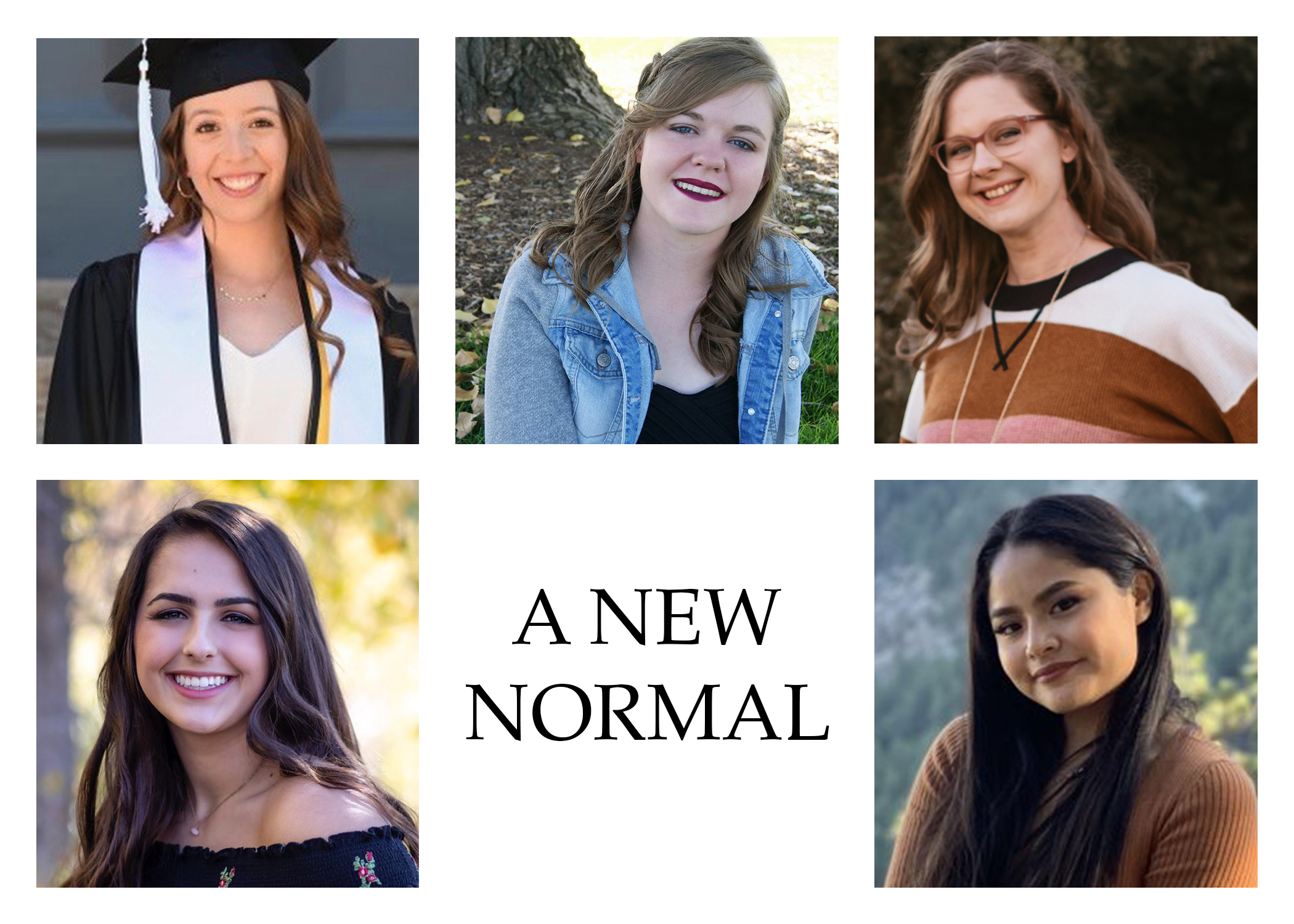
From left, clockwise: Erinn Shea, Kelsey Rickert, Katie Gach, Monica Huacuja Espinosa and Morgan Barnes. (Courtesy photos)
A University of Colorado Boulder graduate student and teaching assistant has been caught in a balancing act of work after her 3-year-old daughter’s daycare was forced to close down.
One CU Boulder junior has found being cut-off from in-person interactions has taken a toll on her mental state.
For a CU Boulder freshman, COVID-19 is the sickest she’s ever been. She worries many aren’t taking health precautions seriously enough to protect people like her immunocompromised family.
In just a matter of weeks, the novel coronavirus pandemic has drastically reshaped life for college students. The CU Independent wanted to understand some of the many ways the highly contagious respiratory disease has created a new normal, so we set out to survey CU Boulder students between April 18 and May 7.
Over those weeks, 110 students responded, with five being interviewed. This is what they told us.
***
Katie Gach,
Graduate student
Fourth-year graduate student Katie Gach is trying to take it one day at a time.
A teaching assistant in CU Boulder’s ATLAS Institute, Gach has had plenty on her plate from grading her students’ assignments to working on her own research. Now, she’s at home with her 3-year-old daughter as well.
“We had to figure out within a couple of days … what is this going to look like with everybody home?” Gach said.

Katie Gach. (Courtesy photo)
Gach’s daughter’s daycare was one of several Boulder Valley schools that shut its doors on March 13 as the coronavirus pandemic threatened public safety.
“She asks about her friends constantly,” Gach said of her daughter. “Her whole world was just gone and she didn’t understand why.”
Now, she and her spouse have cut down on their day-time work hours to care for their young child, trading off on shifts in between meetings.
“We’ve had to coordinate our schedules way more than usual,” she said, adding that while she’s enjoyed the extra time with her daughter, the new routine can be exhausting.
Gach has had to work longer nights to catch up on her doctoral research. While she would usually clock out for the night at around 10 p.m., Gach now finds herself staying up till 11 p.m. or midnight. This is because her stipend from CU is tied to her teaching, so she’s pushed her research to the side during the day.
And she doesn’t even know yet just how the pandemic will affect her research, which she said is people-based and hinges on in-person interactions.
“Cutting down workdays to about six hours each was pretty stressful,” Gach said, adding that while she hasn’t seen an effect on her income, she’s chipped in to help other family members who have.
CU is already bracing for a bleak financial outlook. System President Mark Kennedy and other university leaders have taken a 10% pay cut through furloughs in an effort to mitigate future job losses, something Gach said she appreciates. But she also wants to see it continue in order to protect lower-income employees.
A member of the newly formed system-wide CU union, Gach is supportive of the open letter the union released on its website on March 27 which lays out a list of actions for CU to take to protect various campus workers.
While she said she is lucky to have a joint-income with her spouse, there are many graduate students who would suffer if their pay and benefits from CU were cut.
As she waits for more news from CU administrators, Gach is also keeping up with the updates from the daycare.
Boulder Valley, like many other Colorado districts, is still uncertain about what fall will mean for its students, though scenarios released by the district last week include a possible blend of in-person and online learning. But Gach is confident she and her partner will figure it out.
With so much to be anxious about, she wants other student parents to know to go easy on themselves.
“Be very kind to yourself. Don’t feel like you’re failing your kid because you let them watch too much TV,” she said.
The Data
Less than 3% of respondents are still living on campus
Where are you currently living?
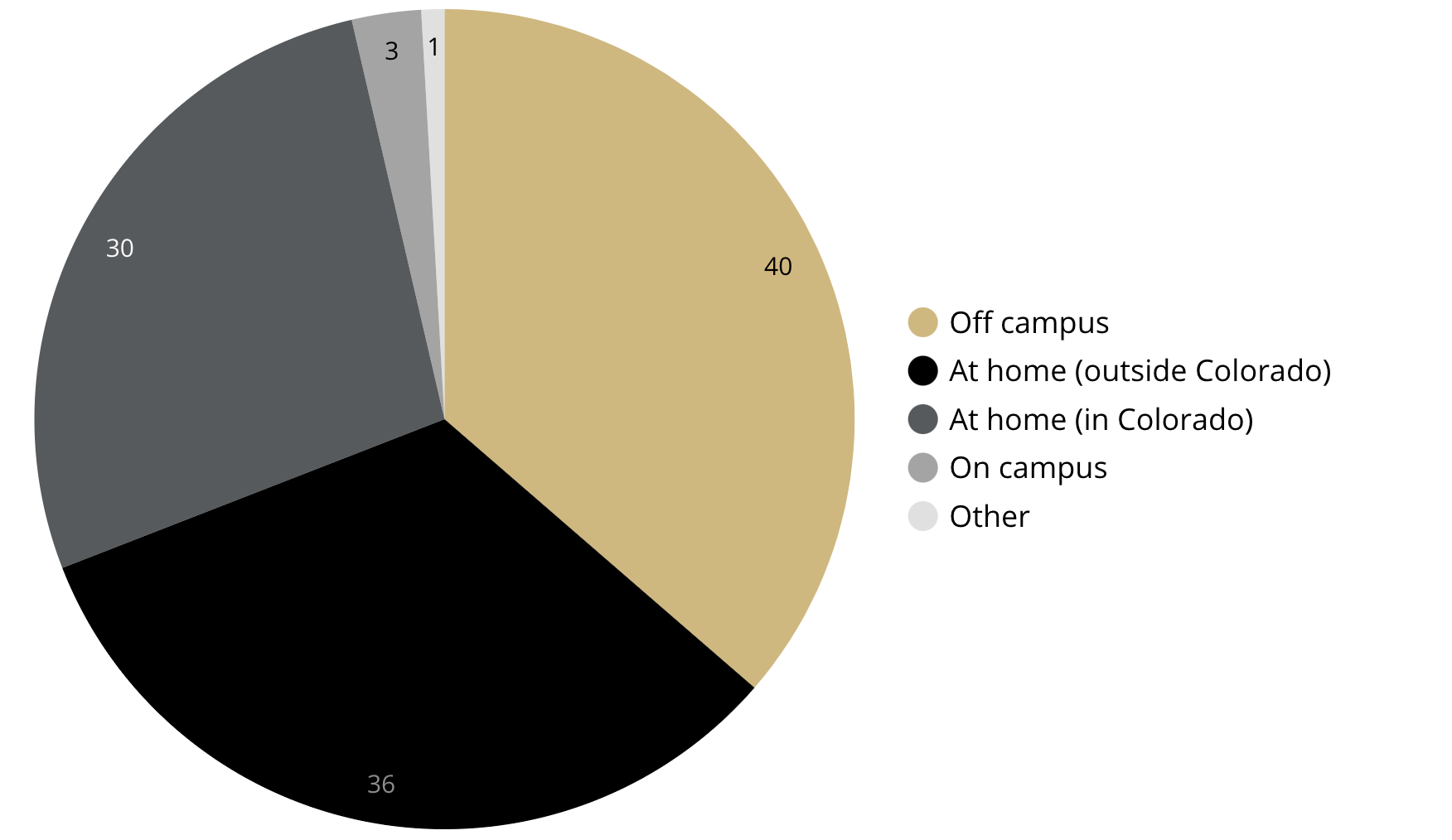
(Casey Paul / CU Independent)
Over 50% of respondents have been in quarantine for over a month
How long have you been in quarantine/social isolation?
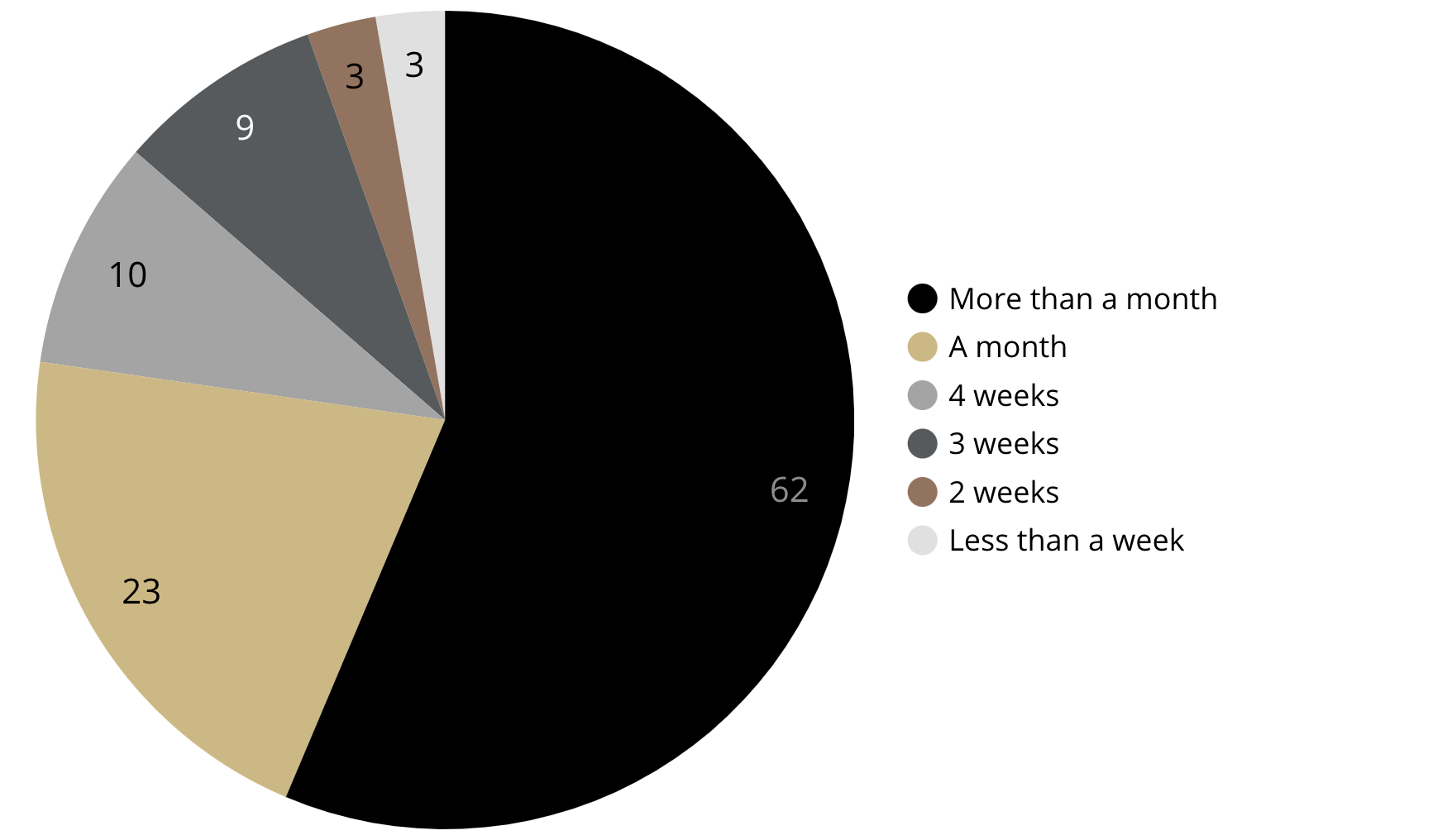
(Casey Paul / CU Independent)
Kelsey Rickert,
Junior
For some students, months of social isolation have taken a heavy toll on their mental health.
Since moving back to her parents’ home from Bear Creek in mid-March, CU Boulder junior Kelsey Rickert finds herself “in a void.” She sleeps sometimes 10 to 12 hours a day and has struggled to keep up with her online classes.
“I’ve found activities to stay busy but they, for the most part, have been very isolated activities without interaction,” Rickert said. “I’ve been having a hard time staying connected to my friend group.”
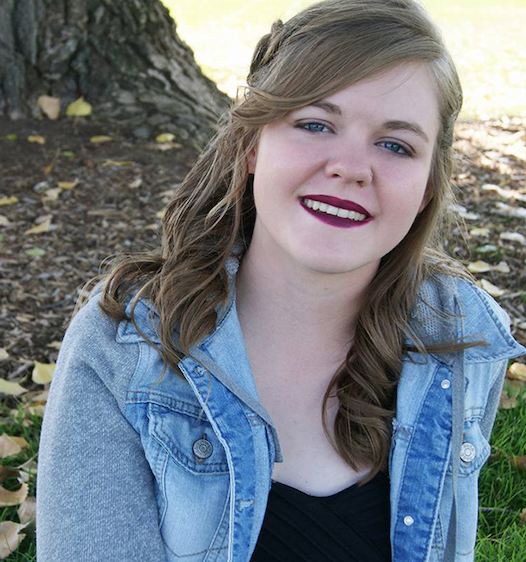
Kelsey Rickert. (Courtesy photo)
Rickert said she’s experienced a relapse in her depression since being in quarantine and, while she’s tried to find outlets, it’s been hard to stay motivated.
“My friends and I started a mutual aid collective for CU students in the first couple of weeks following classes moving online. We had a couple of weeks there that we were going really strong and starting initiatives like a food drive. But, unfortunately … I just couldn’t lead the meetings anymore. So it just kind of dropped off,” she said.
“There’s just been a lot of loss with my activism and my relationship with friends.”
Since the fall semester, Rickert has been on antidepressants and seeing a counselor in CU Boulder’s Counseling and Psychiatric Services. With the campuses soft closure, that too has been uprooted.
“That’s made relapses into depression worse,” Rickert said. “My CAPS therapist is not a licensed practitioner, so she can’t reach out over remote telehealth (services). I felt like she really understood me.”
That fall semester was the first time Rickert had been involved in therapy. While she’s considered exploring telehealth options, Rickert said seeing people in person is more important to her mental health than she had initially thought.
“Seeing people over Zoom now just doesn’t feel as impactful,” she said. “That was one of the first things I noticed, especially when I moved home.”
But some help has come.
Rickert received about $1,800 in reimbursement from Bear Creek and a $1,200 stimulus check from the federal government.
“It definitely has helped. I was starting to run out of funds … now I can put some money away in my savings account in case I can afford rent for an apartment or something like that.”
Rickert said if prices drop she may consider renting an apartment in Boulder instead of returning to Bear Creek. That is if she decides to return to school at all.
“Classes were, unfortunately, maladapted to be online,” Rickert said. “I don’t know that I would enroll for fall if they’re all online.”
Though uncertainty has weighed on Rickert’s mind, she is optimistic for the summer when she can take a break from classes and hopefully string together part-time jobs to keep busy.
Her advice to those facing challenges like hers is to adapt in ways that make you happy. For her final assignment in one class, instead of writing an essay, Rickert chose to make a zine about the class’ topics.
“One thing that really helped me was incorporating a new interest in art into that project,” she said. “If you have to adapt your tasks or hobbies into new things to keep you interested … then do it.”
The majority of respondents know someone who they believe has or had COVID-19
Do you believe you had/have or know someone who had/has COVID-19?
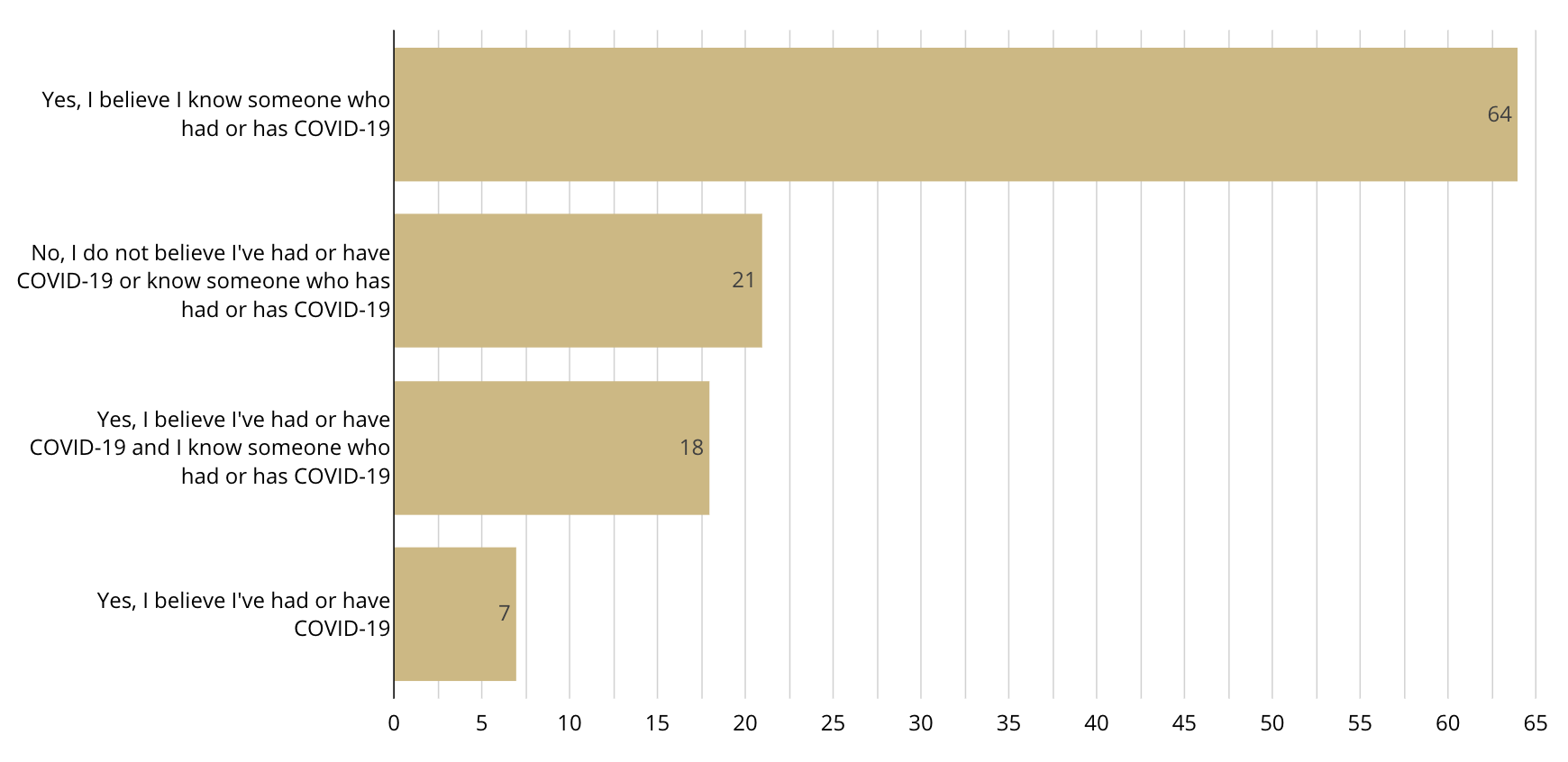
(Casey Paul / CU Independent)
Erinn Shea,
Graduated senior
Senior Erinn Shea said COVID-19 has affected nearly every aspect of her life. Shea, who is a 22-year-old sociology major, called the toll COVID-19 is taking on mental health “immeasurable.”
“My mental health as I have normally known it has been flipped upside down,” Shea said.
Following the beginning of the COVID-19 pandemic, Shea moved from Boulder to Littleton to stay with her parents. In recent weeks, she has struggled with the impact of losing senior year traditions, working post-graduation and worrying about family members like her elderly grandparents and her father who works as an oncology nurse.
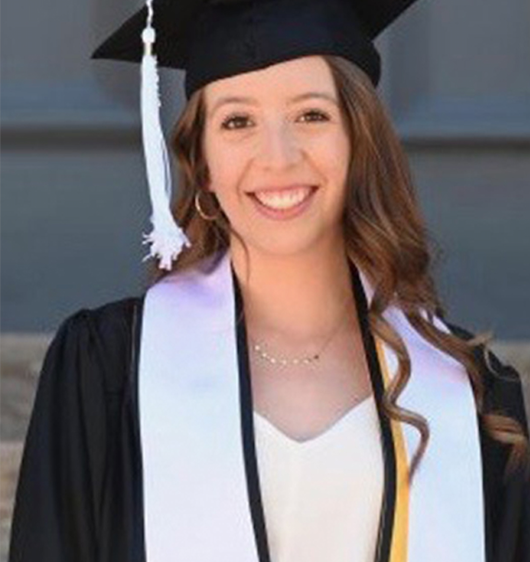
Erinn Shea. (Courtesy photo)
Even small pleasures like hugging her father when he gets home from work have been stripped away.
“It all feels very emotionally sterile,” Shea said. “Growing up, my dad coming home from work was always a big deal and so exciting to see him and give him a hug. It’s hard to see him as distant … that he’s a concern coming home.”
While coping with such emotional stresses, Shea has been trying to balance her well-being with her academic obligations.
As CU Boulder transitioned to online-only classes, Shea said the quality of her education has taken a hit. Losing the social and independent aspects of college, Shea said that even her most accommodating professors cannot make Zoom courses as effective as in-person learning.
“I want to be a teacher and school is so much more than academic curriculum,” Shea said. “A lot of it is having a safe space and creating relationships with professors and friends.”
Having earned her elementary education license, Shea is set to begin student teaching in the fall before applying for her own classroom; however, she is unsure of what’s going to happen now. Shea fears if she’s forced to teach online, it will not give her the full experience of running a classroom.
In addition, Shea said that hiring freezes and the furloughing of recent graduates have made her future suddenly very unstable.
“Everyone’s stuck and it’s just the question of ‘what now?’” she said.
As Shea enters the future in a time of uncertainty, she is most concerned about how things will be after; what lasting mental health effects are going to come out of the pandemic.
Before COVID-19, Shea loved to frequent Broncos games with her father, but now she can’t imagine being able to put herself in such a crowded setting again.
To monitor her mental health during the pandemic, Shea has been using an app to track her emotions daily and provide meditations. However, she hopes the global trauma from COVID-19 will encourage society to put more support systems in place for people dealing with mental health issues.
“I know that my mental health journey in terms of COVID-19 is going to be a long one,” Shea said. “The one thing I could hope is that a greater understanding and compassion for mental health would arise from this.”
Most respondents have elevated stress
How stressed are you currently?
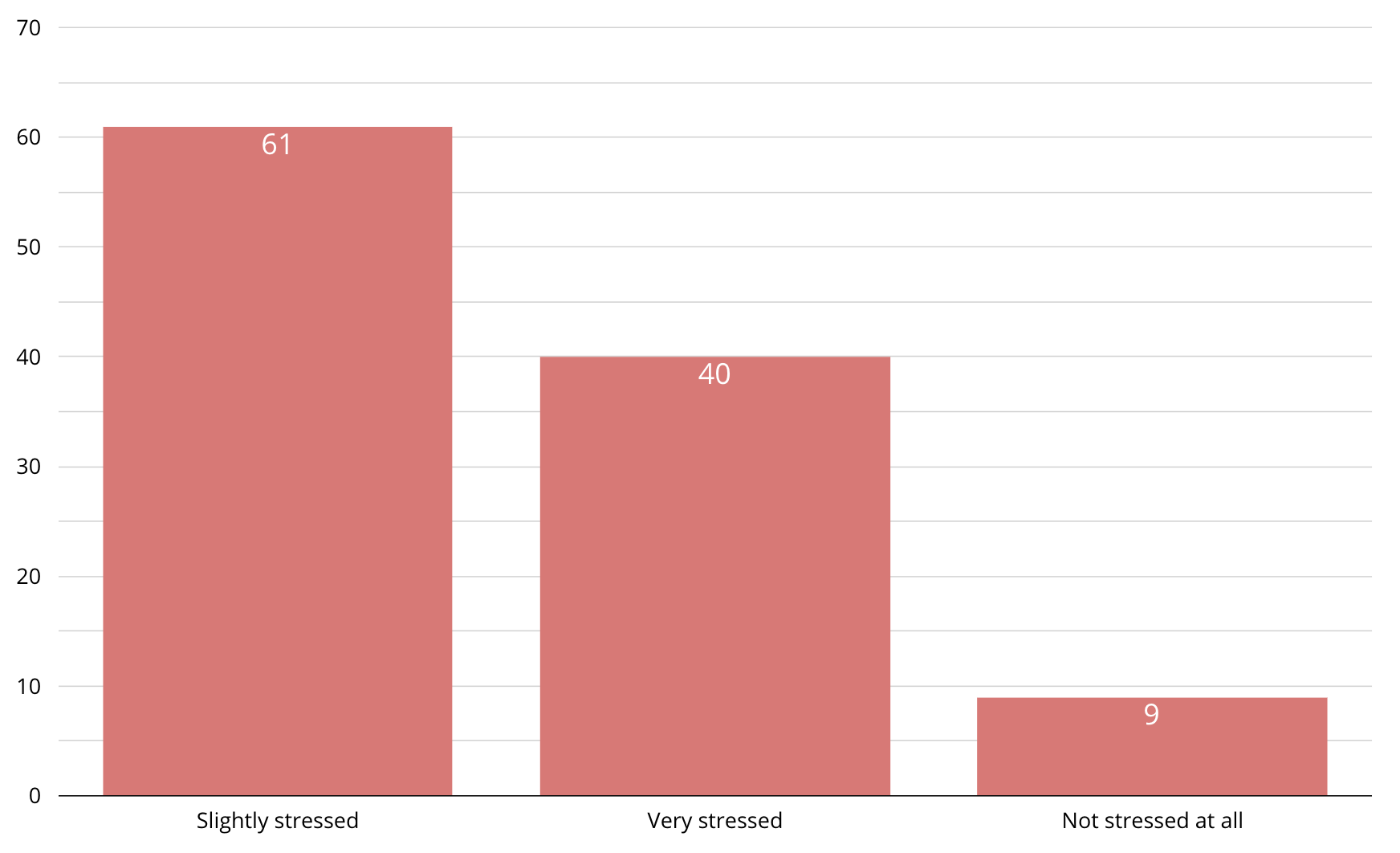
(Casey Paul / CU Independent)
Online classes and mental health are the highest stressors for respondents
What is your greatest stressor currently?
(Respondents were asked to select all that applied)
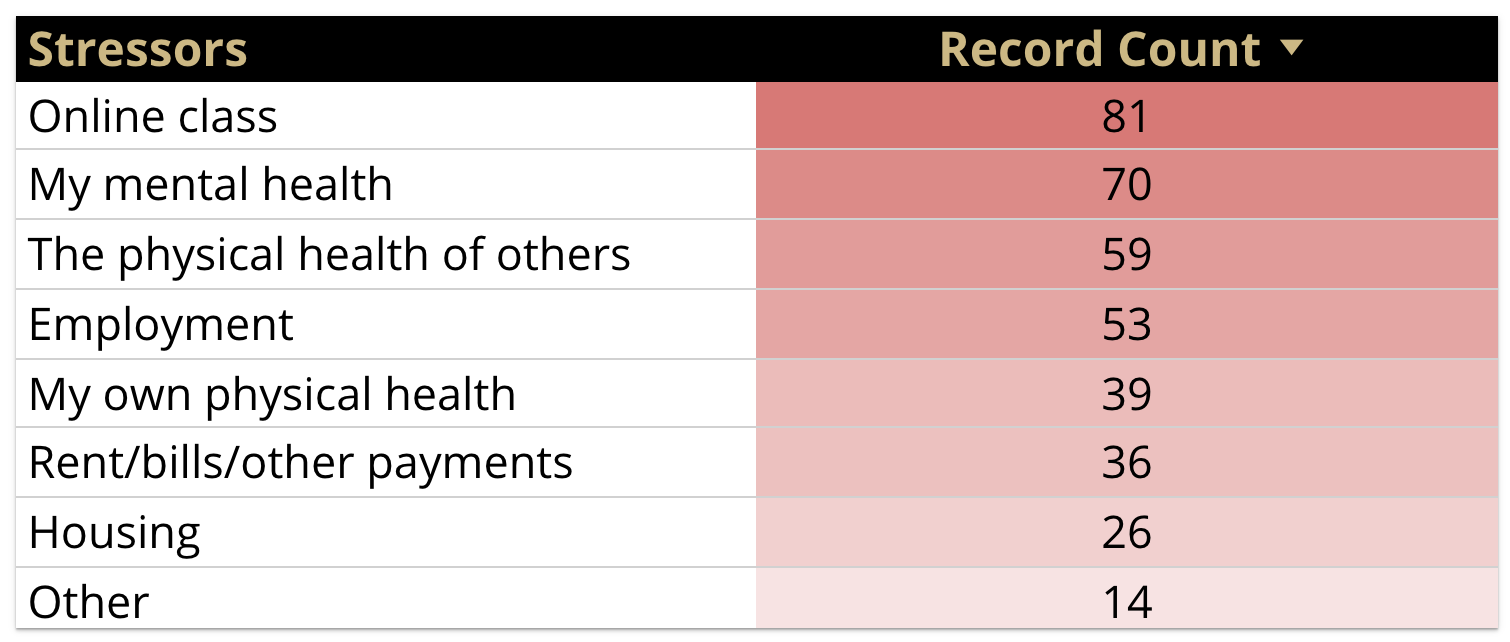
(Casey Paul / CU Independent)
Monica Huacuja Espinosa,
Junior
Monica Huacuja Espinosa is a junior majoring in ecology and evolutionary biology and pre-health. She is also a first generation college student, which has been an added stressor in dealing with repercussions of the novel coronavirus pandemic.
When cases of COVID-19 began being reported in Boulder, Huacuja Espinosa’s parents, who hail from Mexico, asked her to return to their home in Aurora.
“I was happy to come home but didn’t realize all of the added stress this could lead to at the time,” Huacuja Espinosa said. In addition to studying for finals, Huacuja Espinosa took on the task of acting as a translator for her Spanish-speaking parents as they refinance their mortgage.

Monica Huacuja Espinosa. (Courtesy photo)
“Since everything (became) remote they needed help calling the company, as well as faxing documents and doing online signing,” Huacuja Espinosa said. Normally, she said, such documents could be delivered physically and an in-person translator would be available.
In addition to assisting her parents, Huacuja Espinosa was also tasked with helping her younger brother continue with middle school online, including using Google Classroom, Zoom and other virtual resources.
“These are tasks that I would not be worried about or be occupied with under normal circumstances,” she said. “The stress of school (and) family related stress on top of general stress everyone is facing amidst this pandemic was really overwhelming this semester and I could feel it taking a huge toll on my motivation for school.
“I am the first person in my family to go to college and I am very proud of that,” Huacuja Espinosa said. “I always knew that it would be difficult at times not just because of added family responsibilities, but also due to (my family’s) lack of knowledge of the college experience and resources in general.”
She said despite the added responsibilities, she felt an obligation to help her parents who she said have “sacrificed a lot.”
Only 10% of respondents received a stimulus check
Did you receive a stimulus check from the federal government?
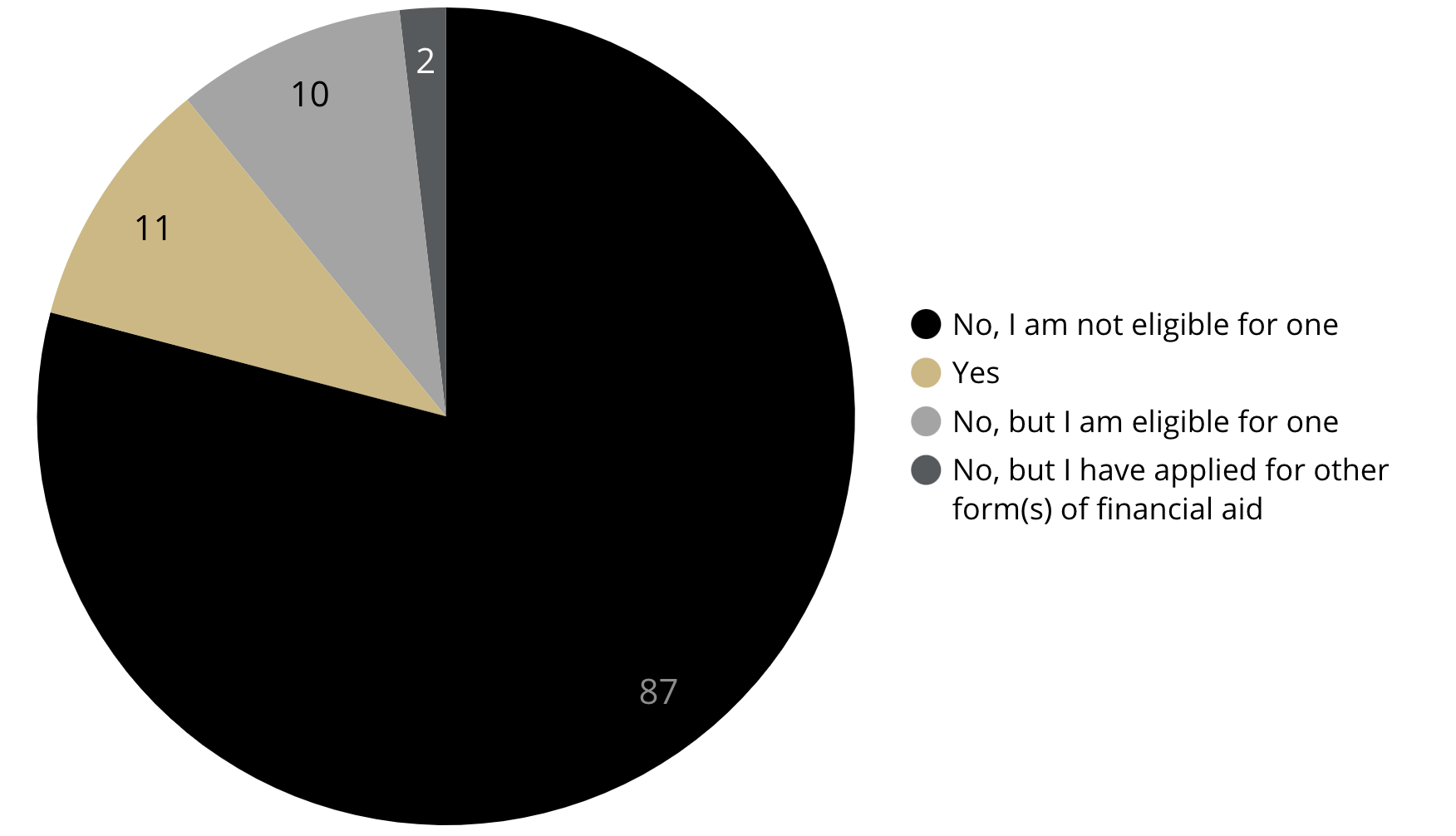
(Casey Paul / CU Independent)
Of respondents who applied for some form of financial aid, most received it through CU Boulder
If you received financial aid, where did you receive it from?
(Respondents were asked to select all that applied)
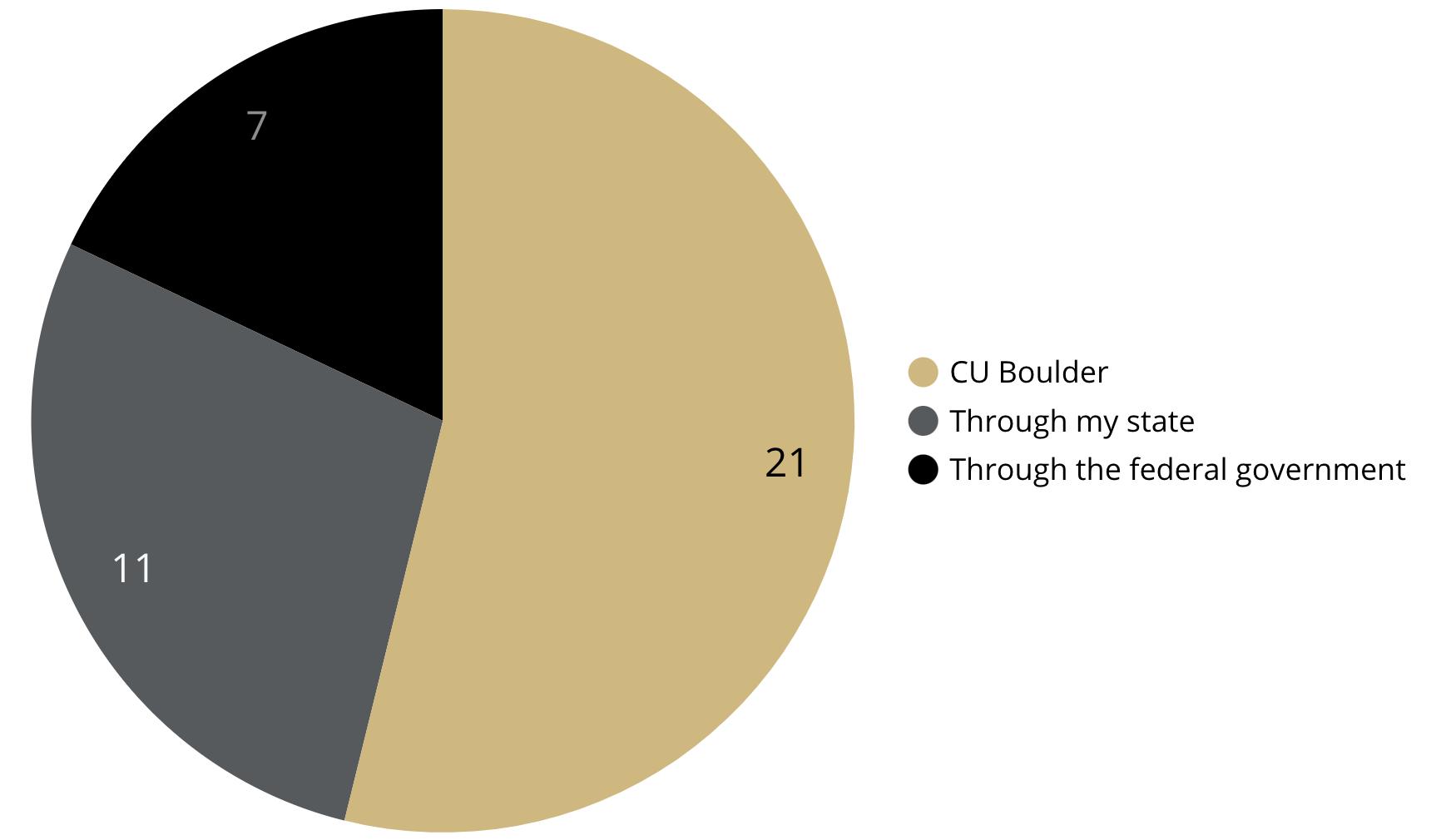
(Casey Paul / CU Independent)
Morgan Barnes,
Freshman
“It just started with a really bad headache, then the next day the sore throat came, and then the next day I was so sick I could barely move.”
Freshman Morgan Barnes began showing symptoms of COVID-19 on Wednesday, April 22. Doctors believed she likely had strep throat when her initial test that Friday came back negative.
“Monday rolls around and I still have a fever, my throat is still so swollen I can’t even swallow, and I was just a mess,” Barnes said. “Tuesday, I was so sick, I could barely stand up. I could barely open my eyes.” When she tested negative for strep throat and returned for a second COVID-19 test, blood results were positive.
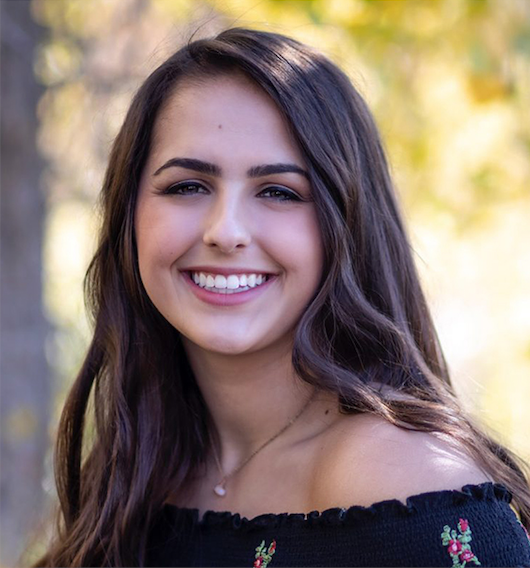
Morgan Barnes. (Courtesy photo)
Barnes has an autoimmune disorder, which places her at risk of severe illness more often than most.
“When flu season rolls around I get the flu. I’ve had whooping cough. I’ve had diseases that most people have never even heard of,” Barnes said. “But this is by far the sickest I’ve ever, ever, ever been.
“Up until (May 8), I was sleeping probably 18-20 hours a day, I wasn’t eating. I’ve lost 10 pounds in 10 days because I’ve just been so sick,” she said.
Not only does Barnes’ autoimmune disorder make her more vulnerable to illness, but her and her entire family have asthma, which only adds to the risk of contracting COVID-19, which “takes a toll on your lungs.” By the time Barnes began showing symptoms of COVID-19, her and her family had already been self-isolating for over a month.
Barnes’ brother and her father have both since contracted COVID-19.
“My mom and my stepdad already worked from home previous to (COVID-19). We haven’t left the house, nobody’s come or gone in, we order in all of our groceries, so really the only way that we would have gotten it would have been through groceries where we missed wiping something down,” Barnes said.
She said after testing positive she was told the virus could spread through air ducts and said even the most extreme self-isolation would not have been enough to stop the spread in her home.
“I mean, even if I had been locked in the basement by myself for two weeks, (my family) still would have gotten it,” Barnes said.
While Barnes’ brother is asymptomatic, her father’s case may be more serious since doctors detected what she called the “COVID crackle” — a crackling sound that doctors hear in the lungs which indicates the development of pneumonia.
For Barnes, the lack of caution she sees in others is “just selfish.”
“It’s just heartbreaking to go on Snapchat and see that kids are still going to parties, kids are still with their friends, kids are still out drinking,” Barnes said. “I’d love to be doing all those things with my friends, but it’s honestly just like people are spitting in my face (and) saying, ‘we don’t care about your health.’
“Yeah, you’re young and healthy, you might be fine if you get it, but that’s not the case for a really great portion of the population,” she said. “Even though you are young and healthy, you might get pneumonia and be put on a ventilator. There’s no way of knowing. It’s different for every single person.”
She wants everyone to take it health precautions seriously regardless of age or health.
“Otherwise you will end up hospitalized or dead or killing someone else.”
See all data from the CUI's survey (best if viewed on desktop)
Contact Outgoing CU Independent Editor-in-Chief Robert Tann at robert.tann@colorado.edu.
Contact Incoming CU Independent Editor-in-Chief Anna Haynes at anna.haynes@colorado.edu.
Contact Outgoing CU Independent Managing Editor Hannah Metzger at hannah.metzger@colorado.edu.
Contact CU Independent Assistant Photo Editor and Data Visualizer Casey Paul at casey.paul@colorado.edu.
